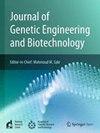Impact of ionizing radiation and low-energy electrons on DNA functionality: radioprotection and radiosensitization potential of natural products
IF 2.8
Q3 Biochemistry, Genetics and Molecular Biology
Journal of Genetic Engineering and Biotechnology
Pub Date : 2025-05-03
DOI:10.1016/j.jgeb.2025.100501
引用次数: 0
Abstract
Ionizing radiation (IR) is a key cancer treatment, but its DNA-damaging effects, particularly double-strand breaks (DSBs) and clustered lesions, pose challenges for therapy. Clustered DNA lesions, often induced by low-energy electrons (LEEs), contribute significantly to genomic instability and repair resistance. Chemotherapeutic agents like cisplatin can enhance IR-induced damage, making tumor cells more susceptible. Emerging strategies in radiation oncology target DNA repair pathways, using inhibitors like poly(ADP-ribose) polymerase (PARP) to sensitize tumors to IR. Natural products, including polyphenols, flavonoids, and alkaloids, offer promising radioprotective effects by scavenging reactive oxygen species and enhancing DNA repair. These agents not only protect normal tissues but also increase tumor sensitivity to IR, improving therapeutic outcomes. Future research should focus on optimizing these natural agents for clinical use, integrating them into radiotherapy protocols for enhanced efficacy and reduced toxicity.

电离辐射和低能电子对DNA功能的影响:天然产物的辐射防护和辐射敏化潜力
电离辐射(IR)是一种关键的癌症治疗方法,但其dna损伤效应,特别是双链断裂(DSBs)和聚集性病变,给治疗带来了挑战。聚集性DNA损伤通常由低能电子(LEEs)引起,对基因组不稳定性和修复抗性有重要影响。化疗药物如顺铂可以增强红外诱导的损伤,使肿瘤细胞更容易受到影响。放射肿瘤学的新兴策略是靶向DNA修复途径,使用聚(adp -核糖)聚合酶(PARP)等抑制剂使肿瘤对IR敏感。天然产物,包括多酚、类黄酮和生物碱,通过清除活性氧和促进DNA修复,提供了有希望的辐射防护作用。这些药物不仅可以保护正常组织,还可以增加肿瘤对IR的敏感性,从而改善治疗效果。未来的研究应侧重于优化这些天然药物的临床应用,将其纳入放疗方案,以提高疗效和降低毒性。
本文章由计算机程序翻译,如有差异,请以英文原文为准。
求助全文
约1分钟内获得全文
求助全文
来源期刊

Journal of Genetic Engineering and Biotechnology
Biochemistry, Genetics and Molecular Biology-Biotechnology
CiteScore
5.70
自引率
5.70%
发文量
159
审稿时长
16 weeks
期刊介绍:
Journal of genetic engineering and biotechnology is devoted to rapid publication of full-length research papers that leads to significant contribution in advancing knowledge in genetic engineering and biotechnology and provide novel perspectives in this research area. JGEB includes all major themes related to genetic engineering and recombinant DNA. The area of interest of JGEB includes but not restricted to: •Plant genetics •Animal genetics •Bacterial enzymes •Agricultural Biotechnology, •Biochemistry, •Biophysics, •Bioinformatics, •Environmental Biotechnology, •Industrial Biotechnology, •Microbial biotechnology, •Medical Biotechnology, •Bioenergy, Biosafety, •Biosecurity, •Bioethics, •GMOS, •Genomic, •Proteomic JGEB accepts
 求助内容:
求助内容: 应助结果提醒方式:
应助结果提醒方式:


